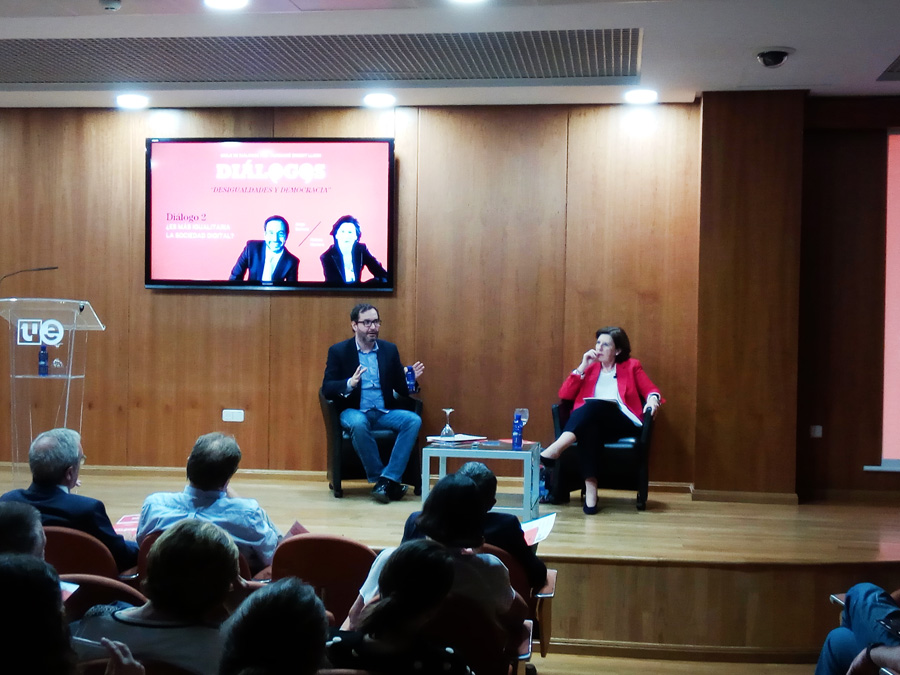Esta web utiliza cookies para que podamos ofrecerte la mejor experiencia de usuario posible. La información de las cookies se almacena en tu navegador y realiza funciones tales como reconocerte cuando vuelves a nuestra web o ayudar a nuestro equipo a comprender qué secciones de la web encuentras más interesantes y útiles.
News

It is not technology itself that causes inequalities, but the differences across society in abilities to use it efficiently
The Ernest Lluch Foundation and the Ivie continued the series of 5 Dialogues on “Inequality and Democracy” with a debate on inequalities in the digital society between Jorge Barrero (Director General of Cotec Foundation) and Helena Herrero (President and CEO of HP Spain). Both experts agreed that new technologies offer countries an opportunity for economic growth. However, they also warned of the risk that inequality will escalate if technological developments do not go hand in hand with the necessary training to make efficient use of these advances.
Jorge Barrero highlighted the role of public bodies in implementing measures that make technology available to all users, thus helping to prevent increasing inequality. Helena Herrero insisted on the need to promote training in technological skills, not only through the years of formal education, but also through on-the-job training in firms. On this point, she noted the paradox of today’s alarming unemployment figures alongside a high demand for skilled professionals that cannot be met.
The President of HP for Spain and Portugal, Helena Herrero, called for public bodies, firms and universities to work together with the objective of training all members of society not only in new technologies, but also in the social and soft skills (teamwork, empathy, critical judgment, etc.) that help individuals “learn to continuously learn” to survive in a constantly changing environment. She also stressed the importance of applying ethics and values to the use of technologies in the new digital society.
The series of dialogues, which will take place until November 22, seeks to raise awareness of the problems arising from the growing digital gap. Ten renowned experts will debate on gender inequality, labor market challenges and doubts regarding the common European project.
With this series, the two institutions will jointly analyze the relationship between democracy and inequality in an increasingly globalized economic context. The venue for the five dialogues is Adeit (Valencia) and they are open to all those interested in sharing in-depth reflections on the relationship between inequality and democracy.
The remaining dialogues of the series are as follows:
- October 29th. Dialogue 3: “Gender inequality”. Cristina Gallach (High Commissioner for the 2030 Agenda for Sustainable Development) and Lina Gálvez (Professor of Economic History and Institutions at Pablo de Olavide University in Seville, and Counselor of Knowledge, Research, and University of the Regional Government of Andalusia)
- November 14th, 2018. Dialogue 4: “The challenges of the labor market: labor inequality and poverty”. Sara de la Rica (Professor of Economics at the University of the Basque Country, and Associate Researcher at FEDEA and Member of ISEAK) and Aitor Lacuesta (Head of the Structural Analysis Division, Bank of Spain)
- November 22nd, 2018. Dialogue 5: “A perplexed Europe: imperfect democracy and the European social model—under review”. Joaquín Almunia (Chairman of Think-Tank CEPS, Visiting Professor at LSE European Institute and Paris School of International Affairs [PSIA], Vice President and European Commissioner for Competition [2010-2014] and Economic and Monetary Affairs [2004-2010]) and Daniel Innerarity (Professor of Political and Social Philosophy, Researcher at “Ikerbasque” of the University of the Basque Country and Director of its Institute of Governance)


